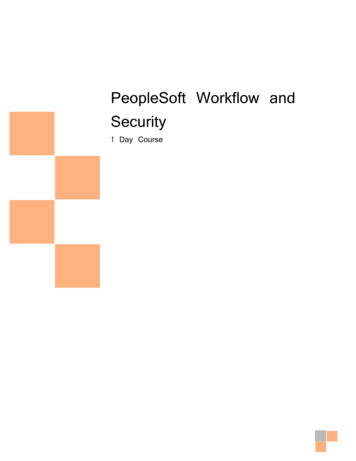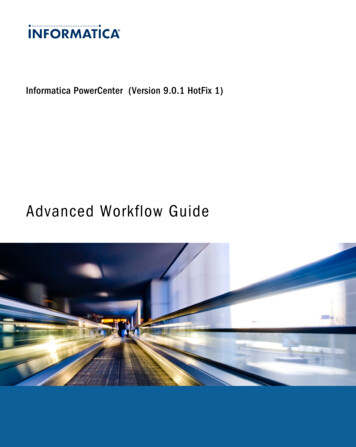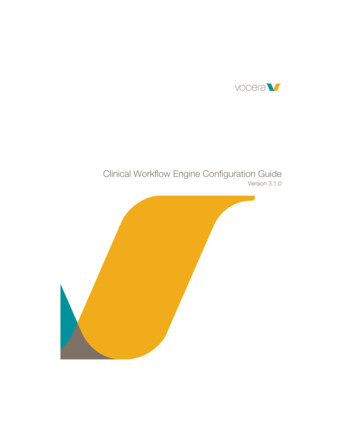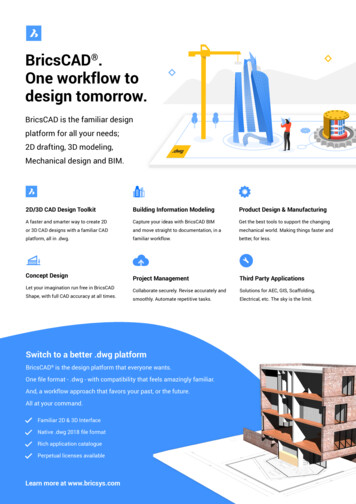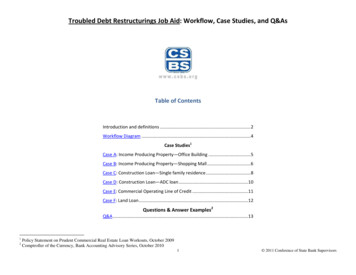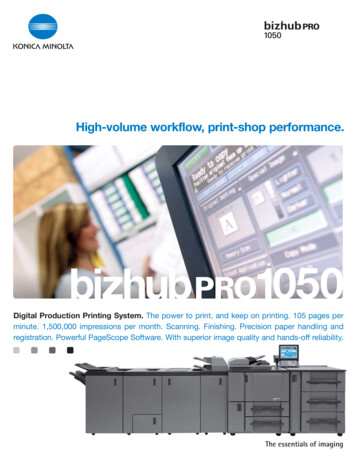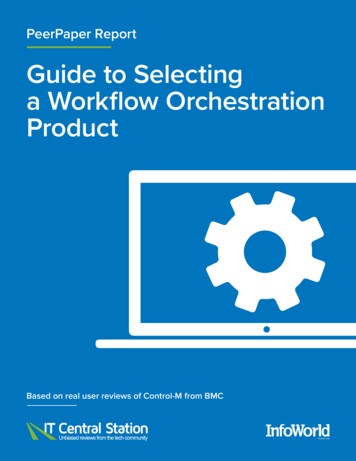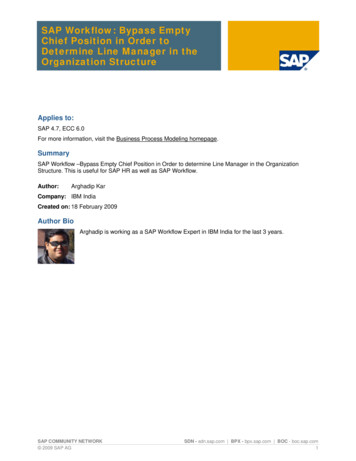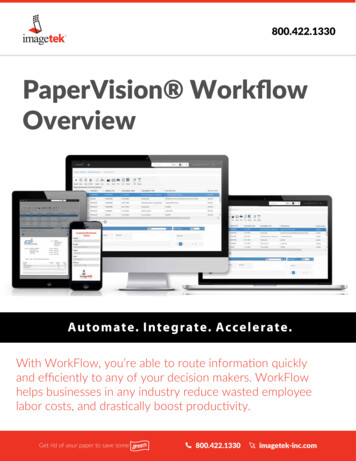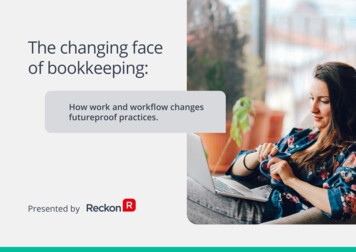
Transcription
The changing faceof bookkeeping:How work and workflow changesfutureproof practices.Presented by1
Table of contents Evolution mindset3 Key changes affecting the bookkeepingindustry4 How workflow technologies drive newefficiencies8 Modernising your workflow solutions10 The benefits of new workflows within achanging environment122
Evolution Mindset inyour BookkeepingPracticeThe digitisation of work is having anoverwhelming impact on industries ofall shapes and sizes.And when it comes to bookkeeping and client accounting in thisdigital revolution, we’re seeing major changes in numerous ways –from increasing client demands to the rise of the jack-of-all-tradesfinance professional, and even in how quickly jobs need to beturned around.To adapt to these changes and ensure their business thrives,bookkeeping and accounting professionals need to adopt futurefirst thinking mindset.They need to embrace the fact that change is inevitable and seekout new avenues to widen their offering while streamlining theirday-to-day tasks.At Reckon we avidly support both small businesses and theaccountants and bookkeepers that serve them, which is whyour mission is to arm every professional with the right tools andinformation to provide their clientele with fast, accurate andefficient solutions.This eBook will dive into a variety of areas that we see as beingpivotal to the changing marketplace and how updated workmodels and workflow solutions can benefit practices, helping themfutureproof themselves against the tides of change.3
Key changes affectingthe bookkeepingindustryEnter any modern office and you’ll see how theworkplace has changed in just a few short years.The rise of internet-enabled tools means businessesare more fast-paced than ever.The age of the dynamic workforceThis evolution of the modern workplace is having a major impacton the bookkeeping and accounting industry in particular – not justwithin the UK, but around the globe.In fact, a December 2018 IBISWorld Industry Report believes this isdue to an “increas[ing] demand for a global approach to accounting,financial and tax advice from the industry”.The report claims that the effect of globalisation on the industrymeans firms have to keep up with global trends, stating: “overthe five years to 2018, demand for audit, tax, advisory and otheraccounting-related services has increased”. 11IBISWorld Industry Report: Global Accounting Services – December 2018 – IBISWorld4
Rise of on-demand workforcesThe gig economy is the new norm – around 4.7 millionBritons were employed on a casual basis in 2019, whileanother 4.9 million were self-employed or sole traders.Accountants Daily puts this dramatic shift down totechnology:“New technology platforms are enabling greater accessto short-term, on-demand contract work, giving workersincreased flexibility to do the work they want, when theywant.” 2This means new types of customers with new ways ofreporting.2The gig economy: What you need to know to get it right – Accountants DailyChanging workplace flexibilityAnd it’s exactly this flexibility that allows a distributedworkforce to pick and choose where – and when – theywant to work. Businesses have to accommodate theseneeds, especially when they are trying to attract top talent.For bookkeeping practices to thrive in this complexenvironment, they will need workflow managementsoftware that can account for this increased mobility.Indeed, the same changes may well be happening in yourown practice – are you personally ready to adopt flexibleworking from your bookkeepers and general staff?5
Shifts in small businessexpectationsArguably more influential to how firms revise their businessmodels in a digital world is the shifting expectations ofclients and assorted small business customers.Rather than boutique practices that focus only on tax,small business owners in the UK are demanding more fromtheir accountants and bookkeepers – including cloud andsoftware advice, loans, advice and legal documentation.Cloud software and the processing of this data is alsonow the norm, so start preparing for, and rejoicing in, areduction of desktop and shoebox customers.Practices that fail to adapt to the changing needs of theirclientele may soon find their customer base looking a littlethin.New roles within bookkeepingpracticesDepending on how far your practice plans to diversify itsoffering, you may need to consider hiring for a numberof new roles within your team, or upskill current staff totransition to new positions. These include but are notlimited to:The Cloud AdvisorThe role of an advisor has expanded. It now incorporatesbeing a leader, embracing cloud and automation technology,enabling more strategic engagement with clients andcompliance within the practice.6
As such, there is an excellent modern opportunity forbookkeepers to re-position themselves as ‘cloud consultants’or advisors. When a client starts using cloud services, theywill need immediate and ongoing support.Bookkeepers are a natural fit for such a position as they aresavvy with business processes, masters of the specifics ofaccounting software, and are absolutely across the detailsof a client’s business. Take the opportunity to provide setupservices, training, ongoing support and process advice.The SpecialistSpecialist services are a niche market and includeemployees with specialised expertise such as financialplanners and business tax advice experts. Practices thatbring these services in-house open themselves up toa wider audience and create opportunities for crossdepartmental learning.The Data and IT expertData analysis is nothing new, but its influence in a business’songoing success has been heightened by the rise of financialtechnologies. For organisations that collect and house hugeswathes of data, they need that information processed toderive useful insights for future decision-making. While thishas been traditionally outsourced, bringing a data analystin-house can speed up time to receive insights. Havingsomeone generally IT savvy is also a huge plus in today’scloud and software driven world – you can’t afford systemsto go down and neither can your clients.7
How workflowtechnologies drivenew efficienciesIn the 2019 Good Bad Ugly Benchmark Report, respondents wereasked to share the biggest technology challenges they are currentlyfacing. Perhaps unsurprisingly, the top two responses were ‘Fullyutilising our existing systems’ and ‘Lack of integration betweensystems’. 3Such issues may stem from an inability for employees to maximisetheir time with existing business and workflow systems. There mayalso be a lack of education on how to best use the software. Orperhaps the systems themselves are outdated, lacking any sort ofcross-system integration, which ultimately leads to wasted time forstaff.What we’re seeing in bookkeeping practices, especially due to thenew roles that businesses are now taking on, is that cloud softwareis making their lives easier – but on its own, the cloud isn’t enough.For practices that are still using a variety of antiquated softwareand communication apps, they could be wasting time, money andmanpower by failing to consolidate all their workflows into a singlesystem.8
Expectations for increased collaborationWith more diverse roles in the workplace and more complex tasksdemanded by clients, bookkeepers can expect to see greatercollaboration on the ground.In their 2018 report – The New Physics of Financial Services – TheWorld Economic Forum found that “collaborative solutions built onshared datasets will radically increase the accuracy, timeliness, andperformance of non-competitive functions, creating mutualefficiencies in operations and improving the safety of the financialsystem.”This increased collaboration will come in many forms, such asdifferent accounting roles working together to solve problems,bookkeepers and clients working together in a face-to-face capacityfor issue resolution, and especially local and international practicescollaborating due to a more globalised industry.3The Good, the Bad & the Ugly 2019: Insights Modern Technology – Business Fitness9
Modernising yourworkflow solutionsThe bookkeepers who ignore this run the risk of redundancy.Ongoing cloud innovation in theaccounting and bookkeeping industrynecessitates that bookkeepers mustuse increasingly capable automaticworkflow systems to efficiently managedata from varied sources.While there are some businesses out there still using manual dataentry, as we have seen with the changing nature of work and thechanging nature of technology - clients are rapidly and increasinglymoving toward cloud software platforms like Reckon OneQuickBooks, Sage and Xero with the help of their bookkeepers.These automated systems allow bookkeepers to forgo their usual(billable) busywork to concentrate on the more intricate aspects oftheir clients’ business.However, software does not operate itself nor deduce meaning andserve clients. Bookkeepers are, of course, still an integral part of theprocess.What needs to happen is greater efficiency in these processesof sending/receiving and processing client information throughworkflow tools.10
Bookkeeping workflow solution keyfeaturesThe key features that your workflow system should have: The chosen system should provide a simple and secure methodfor your clients to send you data and information. The chosen system should also make it simple for you tomanage and review the client’s submitted data easily and add itinto the bookkeeping records. It should deliver the documents and completed reports on timeand conveniently.No matter which system you eventually choose, the key is toremember that workflow as a management process is now vital ifyou want to make sure your business is futureproofed.11
The benefits ofnew workflowswithin a changingenvironmentThe decision is clear: for bookkeeping practicesto diversify their services and embrace the newworkplace model, they must adopt appropriatesolutions that automate repetitive tasks andenable greater collaboration.But what are the actual benefits of investing in a new workflowsolution? How can a single piece of technology help firms adapt totheir changing environment?1. The ability to cater to new client demandsWith new customers, new ways of working and new cloud softwarechanging client demands, new workflows and technology arerequired to keep pace. Perhaps you could check in on your clientsand see what they now want from their bookkeeper? It could beilluminating.After all, more than one-quarter of businesses (28%) say theiraccountants and bookkeepers have never sought any feedback.4These firms are missing opportunities to meet their clients’broadening demands, with full-service bookkeeping now theexpectation.4What do SMEs really think about their accountants? – NAB Professional Services12
2. Driving better client outcomesBy automating workflows and providing modern tools todeal with cloud technologies, practices can provide fastersolutions to their clients with anywhere, anytime solutionsaccessible by any staff member.And for the staff themselves, automated workflow softwaremeans they can monitor all current and upcoming tasksfrom a single interface, allowing them to understand wherea particular project is up to at a glance.3. Technology can improve overall efficiencies withinthe practiceA consolidated workflow tool acts as a one-stop-shop forthe practice and client. Allowing job management to becentralised means staff no longer have to jump betweenapplications, wasting time and energy that could be betterspent attending to their clients’ needs.This productivity is elevated by mobile-friendly software.With expectations of how and when we work constantlyshifting, accounting professionals are able to act as ‘mobilebookkeepers’, servicing their clients while on the go.And when they return to their office, they can quickly jumpfrom their mobile device to their desktop with a seamlesstransition.13
4. Staying competitive in a changing marketBecause finance is such a competitive game, bookkeepingpractices need to get in on the ground floor with effectiveworkflow management tools.Once integrated into the day-to-day, task creation andcompletion will become smoother. This allows accountantsto turn around client work faster while also building anenvironment where people want to work.This can subsequently boost the image of the company,which is hugely beneficial in a gig economy – especiallyconsidering large sectors of the labour pool (e.g. millennials)want to work for businesses that offer flexibility andembrace the idea of a distributed workforce.Business leaders who ensure they are offering flexiblework arrangements, up-to-date automation tools, and aworkplace where staff are satisfied and productive, haveaccess to a skilled labour force at the drop of a hat.For clients, they can expect their needs to be met quicklyand by high-performing accounting professionals.5. Futureproofing the businessFinally, you want to know that any investment you make inyour business will pay dividends if and when it comes timeto move on. Any potential buyer looking at your practice willinevitably review your in-house systems and automationsoftware.14
So, whether you are growing your practice or consolidatingyour investment workflow, it’s crucial to prepare for futurechanges. And investing in digital transformation could boostyour productivity through revenue growth while maximisingyour ROI.Forbes reveals that “McKinsey found [ ] 49% of leadingcompanies, in revenue growth, EBIT growth and digitalinvestment, are investing in digital more than theircounterparts do.”Taking back controlIn a hypercompetitive industry like bookkeeping andaccounting, practices need to take control of theirbusiness’s future by futureproofing themselves againstglobal trends and changes. Workflow allows you to do justthat, in a user-friendly and navigable accountancy solutionthat solves all the problems that siloed software brings.Isn’t it time you took controlof your practice’s future?15
Grow your practice by joining theReckon familyOur job at Reckon is to empower you to be our mosteffective ambassadors. More revenue streams. Happierclients. A dedicated partner team focused on your success.Join our partner program for all the support and resourcesyou need.16
of sending/receiving and processing client information through workflow tools. Modernising your workflow solutions Ongoing cloud innovation in the accounting and bookkeeping industry necessitates that bookk
